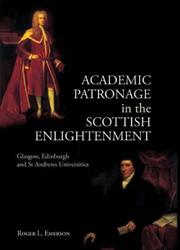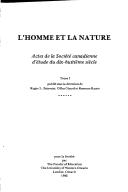| Listing 1 - 10 of 10 |
Sort by
|

ISBN: 0748653651 1281357618 9786611357610 0748631291 9780748631292 9781281357618 9780748625963 0748625968 Year: 2022 Publisher: Edinburgh
Abstract | Keywords | Export | Availability | Bookmark
 Loading...
Loading...Choose an application
- Reference Manager
- EndNote
- RefWorks (Direct export to RefWorks)
This book considers the politics of patronage appointments at the universities in Glasgow, Edinburgh and St Andrews. Emerson explores the ways in which 388 men secured posts in three Scottish universities between 1690 and 1806; from the purge following the Revolution of 1688 to the end of Henry Dundas's political career. Most professors were political appointees vetted and supported by political factions and their leaders.
College teachers --- Enlightenment --- Patronage, Political --- Political patronage --- Spoils system --- Civil service reform --- Academicians --- Academics (Persons) --- College instructors --- College lecturers --- College professors --- College science teachers --- Lectors (Higher education) --- Lecturers, College --- Lecturers, University --- Professors --- Universities and colleges --- University academics --- University instructors --- University lecturers --- University professors --- University teachers --- Teachers --- History --- Faculty --- University of Glasgow --- University of Edinburgh --- University of St. Andrews --- St. Andrews, Scot. --- St. Andrews University (St. Andrews, Scotland) --- Universitas Andreana --- University of Saint Andrews --- Universidad de St Andrews --- Edinburgh University --- Université d'Edimbourg --- Oilthigh Dhùn Èideann --- Academia Jacobi Sexti (Edinburgh, Lothian) --- Edinburgh (Lothian). --- Universidad de Edimburgo --- Universitas Academica Edinburgensis --- Universität Edinburgh --- Università di Edimburgo --- Universiteit van Edinburgh --- Universidade de Edimburgo --- Uniwersytet Edynburski --- Sveučilište u Edinburghu --- Edinburghs universitet --- Universitat d'Edimburg --- Prifysgol Caeredin --- Universitatea din Edinburgh --- Edinburghin yliopisto --- Edinburská univerzita --- Oilthigh (Glasgow, Scotland) --- Universidad de Glasgow --- Glasgow University --- Oilthigh Ghlaschu --- Université de Glasgow --- Edinburgh (Lothian). Academia Jacobi Sexti --- Edinburgh (Lothian). University of Edinburgh --- Clientelism, Political --- Patron-client politics --- Political clientelism --- Political sociology
Book
ISBN: 1317141644 1317141636 1282054368 9786612054365 0754693384 9780754693383 9780754666288 075466628X 9781315580234 9781317141624 9781317141631 9781138265882 1315580233 Year: 2009 Publisher: Farnham, England Burlington, VT Ashgate
Abstract | Keywords | Export | Availability | Bookmark
 Loading...
Loading...Choose an application
- Reference Manager
- EndNote
- RefWorks (Direct export to RefWorks)
The Scottish Enlightenment was a period of intellectual and scientific progress in a country previously considered to be marginal to the European intellectual scene. This volume of essays considers a broad range of themes pertinent to the period, from the European Enlightenment and the Scots relation to it, to Scottish social history and its relation to religion, science and medicine.
Philosophy, Scottish --- Enlightenment --- Hume, David, --- Scotland --- Intellectual life --- Hume, David

ISBN: 0920354149 Year: 1982 Publisher: Ontario University of Western Ontario
Abstract | Keywords | Export | Availability | Bookmark
 Loading...
Loading...Choose an application
- Reference Manager
- EndNote
- RefWorks (Direct export to RefWorks)
Book
Year: 1986 Publisher: Oxford Voltaire foundation
Abstract | Keywords | Export | Availability | Bookmark
 Loading...
Loading...Choose an application
- Reference Manager
- EndNote
- RefWorks (Direct export to RefWorks)
Book
Year: 1973 Publisher: Banbury Voltaire foundation
Abstract | Keywords | Export | Availability | Bookmark
 Loading...
Loading...Choose an application
- Reference Manager
- EndNote
- RefWorks (Direct export to RefWorks)
Book
ISBN: 0080409164 Year: 1992 Publisher: Aberdeen Aberdeen university press
Abstract | Keywords | Export | Availability | Bookmark
 Loading...
Loading...Choose an application
- Reference Manager
- EndNote
- RefWorks (Direct export to RefWorks)
Education, Higher --- History --- University of Aberdeen --- History. --- Aberdeen (Scotland) --- Intellectual life.
Book
ISBN: 0772760357 Year: 2000 Publisher: Toronto University of Toronto Library
Abstract | Keywords | Export | Availability | Bookmark
 Loading...
Loading...Choose an application
- Reference Manager
- EndNote
- RefWorks (Direct export to RefWorks)
Books and reading --- Books --- Books --- History --- History --- History --- Thomas Fisher Rare Book Library --- Scotland --- Scotland --- Scotland --- Imprints --- Intellectual life --- Intellectual life
Book

ISBN: 9781474467315 9781474467346 9781474467339 Year: 2022 Publisher: Edinburgh
Abstract | Keywords | Export | Availability | Bookmark
 Loading...
Loading...Choose an application
- Reference Manager
- EndNote
- RefWorks (Direct export to RefWorks)
Political philosophy. Social philosophy --- Philosophical anthropology --- General ethics --- anno 1700-1799 --- Scotland
Book

ISBN: 9780271062457 Year: 2021 Publisher: University Park, PA
Abstract | Keywords | Export | Availability | Bookmark
 Loading...
Loading...Choose an application
- Reference Manager
- EndNote
- RefWorks (Direct export to RefWorks)
Book

ISBN: 0748628967 9780748628964 1322980934 9781322980935 9780748619122 0748619127 Year: 2022 Publisher: Edinburgh
Abstract | Keywords | Export | Availability | Bookmark
 Loading...
Loading...Choose an application
- Reference Manager
- EndNote
- RefWorks (Direct export to RefWorks)
"Studies the book trade during the age of Fergusson and Burns. Over 40 leading scholars come together in this volume to scrutinise the development and impact of printing, binding, bookselling, libraries, textbooks, distribution and international trade, copyright, piracy, literacy, music publication, women readers, children's books and cookery books. The 18th century saw Scotland become a global leader in publishing, both through landmark challenges to the early copyright legislation and through the development of intricate overseas markets that extended across Europe, Asia and the Americas. Scots in Edinburgh, Glasgow, London, Dublin and Philadelphia amassed fortunes while bringing to international markets classics in medicine and economics by Scottish authors, as well as such enduring works of reference as the Encyclopaedia Britannica. Entrepreneurship and a vigorous sense of nationalism brought Scotland from financial destitution at the time of the 1707 Union to extraordinary wealth by the 1790s. Publishing was one of the country's elite new industries. Key Features: Discusses copyright and piracy with new data at a time when intellectual property laws are returning to 18th-century precedents; Provides new understandings of Scotland's early modern readerships, including women's libraries, music literacy, and the way in which Scots found in the growth of literacy an international marketplace for intellectual property; Original scholarship and previously unpublished source material on secular Gaelic print; 16 exclusive full colour images of rare Scottish bindings from private collections, 25 additional colour plates and 60 black and white illustrations."--
Book industries and trade --- Books --- Publishers and publishing --- Books and reading --- Appraisal of books --- Choice of books --- Evaluation of literature --- Literature --- Reading, Choice of --- Reading and books --- Reading habits --- Reading public --- Reading --- Reading interests --- Reading promotion --- Book publishing --- Booksellers and bookselling --- Library materials --- Publications --- Bibliography --- Cataloging --- International Standard Book Numbers --- Book trade --- Cultural industries --- Manufacturing industries --- History. --- Appraisal --- Evaluation --- Publishing --- Books. --- Books and reading. --- Publishers and publishing.
| Listing 1 - 10 of 10 |
Sort by
|

 Search
Search Feedback
Feedback About UniCat
About UniCat  Help
Help News
News